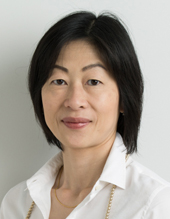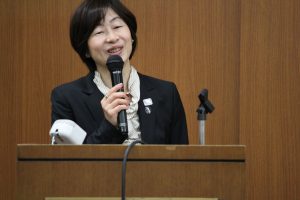This event now concluded. Report available here.
- Lecturer: Yamaguchi Kaori (Bronze medalist at the Seoul Olympics, Associate Professor at University of Tsukuba)
- Date: Saturday, November 26, 2016, 1:30-3:00 pm
- Venue: Lecture Hall, International House of Japan
- Language: Only available in Japanese (without English interpretation)
- Admission: Free (reservations required)
 Born in 1964, Ms. Yamaguchi began judo at the age of six, and took part in competitions with her male counterparts from the fourth grade in elementary school. In 1978, she became the youngest champion at the All-Japan Judo Championships at the age of 13, and kept winning 10 consecutive times in this championship up to 1987 (twice in the 50 kg division, seven times in the 52 kg division). Ms. Yamaguchi won four silver medals in the World Judo Championships, and in 1983, the first gold medal for a Japanese female judo wrestler. She finished her judo career with a bronze medal in the 1988 Summer Olympics in Seoul. After retiring, she has coached the women’s judo team at the University of Tsukuba and served as the women’s training coach for the All Japan Judo Federation. Having led Japan’s judo team for the Sydney and Athens Olympics, she currently teaches at the University of Tsukuba Graduate School, while promoting and improving sports in Japan as a member of the JOC (Japanese Olympic Committee) Board of Trustees and Advisor to the Japan Sports Agency. Her publications include Joshijudo no Rekishi to Kadai [History and Issues of Women’s Judo] (Nihon Budokan, 2012), Nihon Judo no Ronten [Issues in Japanese Judo] (East Press, 2013), and Zannen na Medarisuto [An Unfortunate Medalist] (Chuo Koron Shinsha, 2015).
Born in 1964, Ms. Yamaguchi began judo at the age of six, and took part in competitions with her male counterparts from the fourth grade in elementary school. In 1978, she became the youngest champion at the All-Japan Judo Championships at the age of 13, and kept winning 10 consecutive times in this championship up to 1987 (twice in the 50 kg division, seven times in the 52 kg division). Ms. Yamaguchi won four silver medals in the World Judo Championships, and in 1983, the first gold medal for a Japanese female judo wrestler. She finished her judo career with a bronze medal in the 1988 Summer Olympics in Seoul. After retiring, she has coached the women’s judo team at the University of Tsukuba and served as the women’s training coach for the All Japan Judo Federation. Having led Japan’s judo team for the Sydney and Athens Olympics, she currently teaches at the University of Tsukuba Graduate School, while promoting and improving sports in Japan as a member of the JOC (Japanese Olympic Committee) Board of Trustees and Advisor to the Japan Sports Agency. Her publications include Joshijudo no Rekishi to Kadai [History and Issues of Women’s Judo] (Nihon Budokan, 2012), Nihon Judo no Ronten [Issues in Japanese Judo] (East Press, 2013), and Zannen na Medarisuto [An Unfortunate Medalist] (Chuo Koron Shinsha, 2015).
What is the “Nitobe Leadership Program”?
Report
To former judoka (judo practitioner) Yamaguchi Kaori, currently helping Olympians get ready for the next Games, Japanese judo is facing a major crisis as the sport continues to globalize. “When you get into Olympic mode, winning is everything. People want gold medals above everything else,” she explained. “Judo is a competitive sport, of course, but Japanese judoka also have to recognize their role in conveying the core judo spirit—the philosophy that Kano Jigoro built the sport around—to the rest of the world.” Reflecting on Kano’s teachings, Yamaguchi’s talk was a revealing look at what judo’s principles can teach us all about leadership and teamwork.
Kano Jigoro (1860–1938) translated the takedown-oriented maneuvers of jūjutsu into “judo,” a form of holistic pedagogy that operated on the methodology of combat techniques. Taking a flexible stance on the development and eventual internationalization of the sport, Kano began training non-Japanese practitioners and female athletes early on and worked to give judo an organized structure. Kano’s efforts paved the way forward for judo, which became an official Olympic sport at the 1964 Games in Tokyo and continued to expand its global reach: The International Judo Federation now has a membership of approximately 200 countries.

The dangers confronting modern-day Japanese judo, Yamaguchi says, come from the community’s failure to uphold and inherit the progressive bent that Kanō embraced. In 1948, after Kano’s death, four countries—the United Kingdom, Italy, Switzerland, and the Netherlands—formed the European Judo Union to promote the development of the sport with a united front. Calls for the creation of a more comprehensive governing body led to the creation of the International Judo Federation (IJF) in 1951. Japan passed on the initial invitation to join the organization, which the country’s officials considered a premature initiative, but then relented and became part of the Federation in 1952. Given Japan’s position as a non-founding member, the European contingent continues to maintain a leading role in the Federation’s structure.
When the IJF introduced blue judo uniforms in 1997 in hopes of encouraging fair play and making the competition easier for both judges and spectators to follow, Japan resisted the change, contending that modifications to the standard apparel would go against Kanō’s original vision and subvert long-standing tradition. Despite the fact that collaborative, multi-party discussions constitute the teamwork so essential to the future of the sport, not to mention the fact that Kanō’s brand of leadership espoused a flexible outlook, Japanese judoka have been so fixated on preserving formal “doctrines” that the fundamental “spirit” of the sport has largely fallen through the cracks. In Yamaguchi’s eyes, that staunch preoccupation with canon is one of the reasons that Japan continues to lag behind the vanguard of the International Judo Federation.
The concept of teamwork is crucial, Yamaguchi argues. Rather than a union of like minds and values, she says, real teamwork is the effort to bring people with different perspectives and values together in the pursuit of common goals and objectives—and sports, languages, and the arts serve to bridge gaps and promote mutual understanding. Contemporary judo is full of diversity, with the martial arts traditions of Japan, Russia, France, and other nations shaping their respective styles. Yamaguchi emphasized that diversity is what makes the sport such a compelling form of competition, underscoring the need to respect and find value in those differences.
In closing, Yamaguchi reiterated the need for leadership in the Japanese judo world. In addition to cultivating the kind of leadership that focuses on helping Japanese judoka win, the community also needs leadership that unites Japan—the birthplace of the sport—with judo enthusiasts from across the globe to keep Kanō’s original vision alive and well.